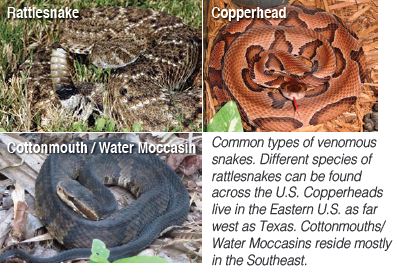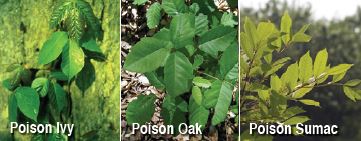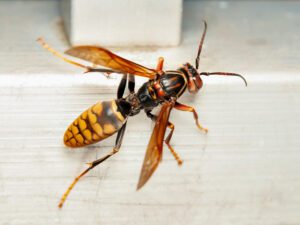By Dave Sanders, Safety and Loss Prevention Manager
 Summer is here, and you’re not the only one who enjoys the warmer weather—a wide range of dangerous plants, insects and reptiles thrive in the summer months. Be on the lookout and learn to prevent contact with these threats to avoid discomfort, at the very least, and at worst, serious illness or disease.
Summer is here, and you’re not the only one who enjoys the warmer weather—a wide range of dangerous plants, insects and reptiles thrive in the summer months. Be on the lookout and learn to prevent contact with these threats to avoid discomfort, at the very least, and at worst, serious illness or disease.
Poison Ivy/Oak/Sumac
 Learn to identify and avoid these plants. The oil that is released by these plants when damaged or touched is called urushiol—and just 50 micrograms (or less than one grain of salt) will cause a rash in about 80-90% of adults.
Learn to identify and avoid these plants. The oil that is released by these plants when damaged or touched is called urushiol—and just 50 micrograms (or less than one grain of salt) will cause a rash in about 80-90% of adults.- If you see these plants on the job, treat them chemically with herbicide. If you must clear them, DO NOT cut or burn them (this helps spread the urushiol). Before pulling the plant, apply Ivy Block to your skin (if available), wear gloves with long sleeves tucked in, and wash immediately after.
- If exposure occurs, immediately rinse skin with rubbing alcohol, specialized poison plant washes, degreasing soap such as dishwashing soap or detergent and lots of water. Note: Urushiol can remain active on the surface of objects for up to five years!
- Good products for treatment include Zanfel, calamine lotion, or hydrocortisone cream
Snakes and Spiders

- Know which venomous snakes and spiders live in your area and how to identify them
- Wear gloves when handling brush and debris, and watch where you place your hands and feet
- If you see a snake, DO NOT try to capture or kill it—step back and allow it to proceed
- If you or a coworker is bitten, take note of the color, pattern and shape of the snake or spider. If possible, even take a picture of it. Being able to identify the species is key to treatment.
Ticks and Mosquitos
- Use insect repellent containing 20-30% DEET on exposed skin and clothing. If the product contains permethrin (which kills ticks), spray on clothing but not on skin
- Avoid wearing perfumes, colognes or scented hygiene products
- Inspect your skin and clothes daily—check armpits, groin, and scalp areas for ticks
Bees, Wasps, and Hornets
 If you know you have an allergy to stinging insects, take the necessary precautions (i.e. carry an EpiPen®)
If you know you have an allergy to stinging insects, take the necessary precautions (i.e. carry an EpiPen®)- Know where nests and hives are often found—in trees, under roof eaves, on equipment such as ladders. Stinging insects typically congregate near flowering plants, trash cans, and outdoor eating areas.
- Keep work areas free of food and open containers—put away soda cans and leftover food
- If a stinging insect is near you, stay calm and DO NOT swat at it—move away slowly
Proper Attire and Prompt Attention are Key
For all of the above threats, the first step in prevention is proper attire. Wear a hat, a long-sleeved shirt tucked into pants, and long pants with pant legs tucked into boots. Shake out your clothes, shoes, and gloves before putting them on to be sure they are free of ticks and spiders. Shower as soon as possible after working outdoors and wash and dry work clothes at high temperatures. Inspect your body daily for ticks, mosquito bites, and poison ivy/oak/sumac.
As always, if you come into contact with any of these pests or plants or if you start to notice symptoms of more serious conditions, alert your supervisor or seek professional medical attention immediately.
 Learn to identify and avoid these plants. The oil that is released by these plants when damaged or touched is called urushiol—and just 50 micrograms (or less than one grain of salt) will cause a rash in about 80-90% of adults.
Learn to identify and avoid these plants. The oil that is released by these plants when damaged or touched is called urushiol—and just 50 micrograms (or less than one grain of salt) will cause a rash in about 80-90% of adults. If you know you have an allergy to stinging insects, take the necessary precautions (i.e. carry an EpiPen®)
If you know you have an allergy to stinging insects, take the necessary precautions (i.e. carry an EpiPen®)